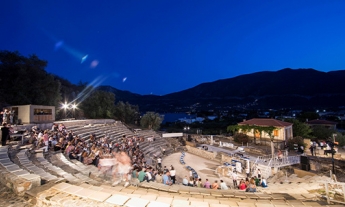With a total of 93 productions and the participation of some 2,500 artists from all over the world, the Athens & Epidaurus Festival for 2024 presents a programme that is polyphonic, combative and full of true beauty, promising an exciting summer of culture...
This year, every Friday and Saturday, from July 5th to August 24th 2024, the ancient Τheater of Epidaurus comes alive and hosts seven new exceptional performances for the 2024 artistic season of the Athens & Epidaurus Festival. Let's go, to indulge in the magic of the landscape, Art and the Ancient Greek theatrical tradition!
Performances:
5 - 6 July 2024
ΤΙMOFEY KULYABIN - World Premiere
Iphigenia in Aulis, by Euripides
After the masterful Three Sisters (2018), which will always be remembered for the complete rendition of Chekhov’s play in sign language, the internationally acclaimed director Timofey Kulyabin returns to the Athens Epidaurus Festival, which had introduced him to the Greek audience. Worldwide appreciated for his exceptional poetic perspective, the Germany-based director will be opening this year’s performances at the Ancient Theatre of Epidaurus, with the Festival’s international production of Iphigenia in Aulis by Euripides.
Prominent Greek actors and actresses are to give flesh and bone to this stellar artistic project. Iphigenia in Aulis will have its world premiere at Epidaurus. Designed exclusively for the Argolic theatre, this long-awaited production ingeniously brings together a foreign director with Greek performers once again, further consolidating the Festival’s international and extrovert character that is consciously being pursued over the past years.

12 - 13 July 2024
NATIONAL THEATER – THEODOROS TERZOPOULOS
Oresteia by Aeschylus
For the first time, the National Theatre of Greece collaborates with the internationally acclaimed Greek director and teacher Theodoros Terzopoulos, who will be directing Aeschylus' Oresteia, the only surviving trilogy of Ancient Drama and the last surviving work of the author (created only two years prior to his death), in a single performance.
Oresteia was introduced in Athens, at the City Dionysia (En Astei Dionysia) in 458 BC, a year of high tension between the proponents of Oligarchy and those of Democracy, reflecting the political, historical, and social conflicts, and the violent upheavals of the time. Among the reasons for this tension were Ephialtes’ democratic reforms concerning the operation and structure of the Supreme Court (Areios Pagos). And while Athens at home was in a period of transition, it pursued an extremely bold policy towards other cities, allying at the same time with Argos, which had seceded from the Peloponnesian Alliance. The influence of both these historical events on Oresteia is apparent.
The author draws his inspiration from the myth of the Atreidae and the terrible curse cast upon their house. After ten years of war, the Palace of Mycenae is about to welcome its king, Agamemnon, as the triumphant general of all Greeks. Yet his arrival from Troy also means his death by the hand of his wife Clytemnestra, aided by Aegisthus. In Choephori (The Libation Bearers), the return of Orestes brings the longed-for revenge for Electra. The Chorus rejoices at the royal house’s redemption and Orestes sets out, as a suppliant, to seek Apollo’s protection at Delphi, while the Erinyes (Furies) come after him. Eumenides is based on the creative retelling of certain Attic cult myths about Orestes' flight to Athens and his trial by the gods of Olympus. Aeschylus' plot is further enriched by the establishment of the Areios Pagos on Athena’s initiative and the court’s involvement in the breaking of the curse. Balance and reconciliation then come to close a cycle of blood and vengeance.
A work of astonishing maturity, integral aesthetics, intellectual depth, and a multitude of philosophical inquiries; a work that expands the boundaries of art and boldly defends a democratic constitution.
To date, Oresteia has been staged by the National Theatre of Greece at Epidaurus five times: in 1954 and 1959 directed by Dimitris Rontiris, in 1972 directed by Takis Mouzenidis, in 2001 directed by Yannis Kokkos, and in 2019 by three directors, Io Voulgaraki, Lilly Meleme, and Georgia Mavragani, each of whom undertook a tragedy in their first production at Epidaurus.

19 - 20 July 2024
NATIONAL THEATRE OF NORTHERN GREECE – GIANNIS KAKLEAS
Plutus by Aristophanes
We are in 388 BC. The Peloponnesian War has ended with the Athenians left crashed and defeated, which marked the end of the Athenian hegemony. The honest Chremylus, a poor Athenian peasant, Aristophanes’ alter ego, is experiencing the new reality in a traumatic way: social values, ideas, and morals have fallen away.
The lack of resources and social justice, as well as the fear of impoverishment, terrify this romantic utopian, especially for his child’s future. He resorts to the Oracle of Delphi posing the agonising question "what can I do to ensure a secure future for my child?". The oracle tells him to take care of the first helpless person he meets on his way. This is none other than the god Plutus, who generously gives away gold, money and all material goods Chremylus and the whole society has dreamt of! They are all rich now! Their dream has come true. But deep down, this dream turns out to be a test: in the absence of social cohesion and solidarity, self-awareness, and social conscience, how can the common good be served?
Almost 2,500 years later, the Aristophanic question remains relevant. Giannis Kakleas, who, in addition to directing, is also the translator of the National Theatre of Northern Greece’s production, notes: "Our poet, in his own, uniquely satirical manner, shows us a way of managing material goods, but always with the interests of the Polis in mind –a Polis with just, honest, and virtuous citizens. Is this utopian? Possibly. Aristophanes however reserves the right to dream!".
Manos Vakousis, recently awarded with the Karolos Koun Grand Prize for Theatre, will be portraying Chremylus. The cast is joined by Alexandra Palaiologou. The musical part of the performance will be joined by Xatzifrageta and Nalyssa Green. The Professor of History at the University of Athens Maria Efthymiou appears on stage in the parabasis.

26 - 27 July 2024
COMÉDIE-FRANÇAISE – TIAGO RODRIGUES
Hecuba, not Hecuba
After the triumphant reception of Electra / Orestes directed by Ivo van Hove in 2019, the leading company of Comédie-Française comes back to Epidaurus, this time with the much talked about Portuguese director Tiago Rodrigues, the new director of the Avignon Festival.
In his first collaboration with Comédie-Française, Tiago Rodriguez takes on the story of Hecuba. Adjusting it in his ‘head-on’ idiom, he intertwines an ancient human being’s drama, with that of a modern-day heroine always on the same ageless canvas –in particular, a Trojan woman’s and a present-day actress and mother’s. Tiago Rodrigues is used to saying, that his writing does not have to do with the theatre, but the actresses and actors that make up the theatrical play. Here, an actress rehearses Euripides’ Hecuba, as she holds the role of Priam’s widow. After the defeat of Troy, Hecuba has lost everything: her husband, her throne, her freedom, and, what’s most tragical, almost all her children – she is a woman seeking for justice.
The tragic myth nonetheless meets the actress’ real life in a gut-wrenching way. Her autistic teenage son suffers abuse in the hands of the staff at the institution he is committed and she trusted. Whereas the parties responsible try to cover up the case, she goes public. The rehearsals are ambiguously interjected with the judicial investigation.
Within an idiosyncratic, borderline context, the two worlds are being juxtaposed in a harrowing and shattering concoction of myth and reality, theatre and justice.
The performance will be presented in Epidaurus immediately after its premiere in July at the Avignon Festival.

2 - 3 August 2024
NATIONAL THEATER – THANOS PAPAKONSTANTINOU
Bacchae by Euripides
Euripides’ Bacchae –the tragedy of Greece, of rulers and of people, according to Jan Kott– was written in the third decade of the Peloponnesian War, when History had already run rampant, and recounts the arrival of Dionysus in Thebes. Euripides composed it during his stay in Macedonia, where he was introduced to the Dionysian cult. When the god Dionysus arrives in Thebes, King Pentheus refuses to acknowledge his first cousin as a god and by his power makes the spread of the new cult illegal. His defiance arouses the wrath of Dionysus who, through a tragic reversal between the persecutor and the persecuted, leads Pentheus to annihilation by his own mother.
The work is marked by strict consistency of form and enormous inner strength, while at the same time revealing the poet’s keen interest in mysticism and ecstasy. The tragedy’s central dramatic themes are the possibilities of the soul, human virtue, self-consciousness, prudence, and fallacy, the rational and the irrational, all of which emerge from the antithesis between man and God, the same antithesis from which the drama’s tragic conflict arises.

9 - 10 August 2024
ARIS BINIARIS
Birds by Aristophanes
In Birds, Aristophanes tells the story of how two Athenians, Pisthetaerus and Euelpides, make the decision to leave the world of men in search of a city without pettiness and corruption, where one can live in peace and justice. Together with the Birds, they establish a state in the ether and build a wall between men and the gods.
The staging places the play in a pre-tragic environment, approaching it as a primal ritual. And as with any ritual, a troupe brings the myth to life experientially. The two protagonists ask, allegorically, to be "emptied" of all other human qualities and "inhabited", sometimes voluptuously and sometimes furiously, by the bestial drive of the birds in a performance-concert. Backed by the explosiveness of music and movement, Aris Biniaris creates a contemporary satire, dragging us into an electrifying ‘chant’ that sheds blinding light on the critical issues of the city led at all times by the Aristophanic work.

23 - 24 August 2024
GREEK ART THEATRE KAROLOS KOUN – NEOS KOSMOS THEATRE – ΜARIANNA KALBARI
The Suppliants by Aeschylus
Sixty years after the play’s first staging at the Ancient Theatre of Epidaurus, the Karolos Koun Art Theatre in collaboration with the Neos Kosmos Theatre presents Aeschylus’ The Suppliants, directed by Marianna Calbari: a poetic and deeply political play at the center of the modern concern on the concept of asylum in a democratic society –especially when those who are persecuted are women.
The play (the first and only surviving play from Aeschylus’ Danaid Tetralogy) features a collective female character: the Chorus of the fifty Danaïdes who, together with their father Danaus, abandon Libya and Egypt and seek asylum in the city of Argos. Like their ancestress Io, whom Hera mercilessly persecuted by sending her a bothersome gadfly, the oestrus, to torment her. The Danaïdes now struggle to flee a forced marriage to the fifty sons of Aegyptus. The myth raises the issue of the female identity and place in society, while recounting the chronicle of the settlement and predominance of the Greeks in the land of the Pelasgians, the so-called pre-Greeks.
The Danaid Suppliants speak of the needs that lead people to uproot themselves from their land, the fierce fate of the refugee, the value of justice, the principles of democracy. Above all, they speak of the Woman’s struggle against the Man, who seeks to force himself on her.
The performance redemptively unites the voices of the ancient heroines with those of today’s heroines, through an awe-inspiring Chorus of fifty young women, led by the words of Lena Papaligoura and Loukia Michalopoulou (in the roles of Hypermnestra and Amymone respectively) and Marina Satti’s vocals.
The Chorus is composed of members of the CHÓRES female vocal ensemble, young actresses-students of the Art Theatre Drama School, and dancers-acrobats of the "Ki omOs kineitai" group (led by Christina Souyoultzi). The male role of Pelasgus, king of the pre-Hellenic Pelasgian people, which is believed to have been matrilineal, is portrayed by Lydia Koniordou. The two figures of patriarchal power are portrayed by Akis Sakellariou and Giannis Tsortekis.

Tips
All performances start at 21:00 and are played with Greek and English surtitles.
The theater's car park has plenty of spaces for cars and coaches.
Wheelchair users are granted vehicular access to the square of the theatre. Special adapted portable toilets are available.
For any inconvenience and delay to be avoided, you are advised to arrive 90΄ before the start of each performance.
Ticketing - Box Office info
Ancient Theatre of Epidaurus - box office operates Monday to Thursday 10:00-14:00 and on performance days (Fridays, Saturdays, Sundays) 10:30-21:00.
Τ. +30 210-7234567 (Monday to Sunday 09:00-21:00). Purchase online: aefestival.gr
E-mail: tickets@greekfestival.gr
Not permitted
Entry into the theatre after the start of a performance, except during an interval.
The attendance of children under the age of six.
Smoking, and the consumption of food and drink inside the theater.
The use of mobile phones during performances.
Entry into the theater in high heels.
Photography, with or without flash, and sound or video recording during a performance.
The tipping of staff.
Ancient Epidaurus Theater's Exhibition Hall – Periodic Exhibition
"Hippolytus - Phaedra"
July 5th – August 24th 2024
On the occasion of the 70th anniversary of the informal opening of the Epidaurus performances in 1954 with Euripides’ Hippolytus directed by Dimitris Rontiris (National Theatre of Greece) with Alekos Alexandrakis in the title role, the Epidaurus exhibition hall, inaugurated in 2023 thanks to the valuable support of the Ministry of Culture, comes to life again this year with a temporary exhibition dedicated to the figures of Hippolytus and Phaedra. Open to the public throughout the performances at the Argolic theatre, the exhibition presents the iconic hero and heroine as we got to know them at the Ancient Theatre of Epidaurus during its 69 years of operation. According to the myth, Phaedra, wife of King Theseus, a pawn in the revenge plan of the goddess Aphrodite, falls in love with Hippolytus, son of her husband and the Amazon Hippolyta. Dedicated to the worship of the goddess Artemis, Hippolytus denies Phaedra’s love, with dire consequences.
Precious documents from the archives of the Athens Epidaurus Festival and of many other cultural organizations and theatre companies invite the visitor to a journey through costumes, masks, maquettes, scores, and audiovisual material in a modern exhibition environment. A fascinating retrospective of the productions and performances, that captured the momentum of unrequited love in all its forms in the national landmark of Ancient Drama, from the 1950s to the present day.
5 Ιουλίου – 24 Αυγούστου 2024 - Every Friday and Saturday
"Little Trackers"
Children’s creative workshop in Epidaurus - For children 5-12 years old.
The successful theatre education programme continues this year, familiarising children with the wonderful and mysterious world of ancient myths. Concurrently with grown-up audiences fully immersed in performances at the Ancient Theatre of Epidaurus, children are creatively engaged, approaching the content of the play watched by the adults.
A team of experienced theatre educators and facilitators of music/movement and aesthetic education are participating in the programme.
Fridays and Saturdays, during the performances at the Ancient Theatre of Epidaurus.
As part of the International Network of Ancient Drama.
Did you know that?
The Athens and Epidaurus Festival is Greece’s leading cultural Organization and one of the oldest continuously running festivals in Europe, spanning now 67 years of vivid cultural presence.
Theatre director Katerina Evangelatos was appointed Artistic Director in September 2019.
The famous ancient Τheater of Epidaurus is located within the archaeological site of the Sanctuary of Asklepios, in the Argolis prefecture of Peloponnese. It is a half-hour drive from Nafplio and approximately two hours from Athens.












